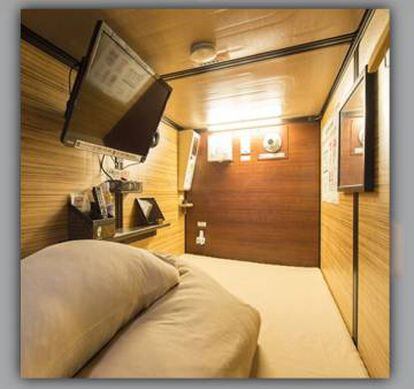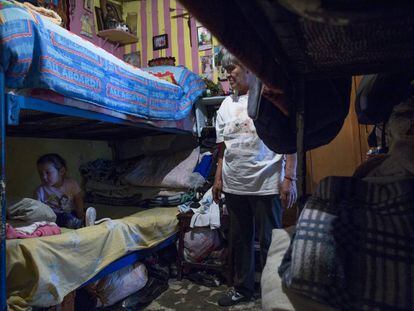Barcelona warns it will not grant license to controversial capsule apartment project
Company claims tiny pods are a good temporary solution for people struggling financially, but the city says they breach rules on minimum living space requirements


A Barcelona company has announced that it is building an apartment that will house 15 people in tiny capsules spread over just 100 square meters, but city authorities have said they will never issue a business license for such an initiative.
Haibu 4.0, the company behind the project, has drawn inspiration from the capsules used in some hotels in Japan, where clients sleep in pods that contain a bed and a TV set attached to the ceiling. Haibu means beehive in Japanese, and the company website says that people are social creatures who were meant to live in communities that help each other out, like bees in a hive.
The company says the pods are not meant for tourists, but for longer stays by residents who cannot afford the soaring rents of the Catalan capital or who have long daily commutes to work from their regular residence. Haibu 4.0 has been running ads for weeks, offering rooms for €200 a month, and says it has received 500 applications already.
“We are not thinking about this as the housing of the future, but if we look around, we see people who are struggling financially,” said Edi Wattenwil, one of the partners at Haibu 4.0. “My partners and I thought it would be a good idea to create this kind of apartment so that people can stay here for a while until their own financial situation improves.”
Citizens who are struggling financially should not have to sleep out on the streets or in a hostel
Edi Wattenwil, Haibu 4.0
Wattenwil says that he and his colleagues wanted to create affordable accommodation that provides greater privacy than a hostel. “At hostels there are rooms with five to six beds that are separated by nothing more than a curtain,” he says.
The partners – there are more than a dozen of them – began to look for a location where they might be able to build Spain’s very first capsule apartment. “Architects and zoning laws make it mandatory to reserve the ground floor of residential buildings for commercial activities. But many of these premises never get used, and they lie empty. We found such a property in the Bordeta neighborhood that adapts perfectly to our idea.”
The group rented the space in July and began adapting it to their needs. “Each pod is 120cm wide, 120cm high and 200cm long. Inside there is a bedbase that you can lift to put suitcases inside, a headboard that can also be used for storage, a folding table, shelves, a wall socket and a USB charger,” explains Wattenwil. There are common areas and shared bathrooms.
City says no
But the city of Barcelona frowns on the initiative. Housing councilor Josep Maria Montaner said there is no room for such a project in Barcelona.
“The rules say that any housing unit must have a surface area of at least 40 square meters, which means that this company will never obtain the necessary operating licenses,” he warned.

Janet Sanz, one of the deputy mayors, added that the city has not received any application for such a housing project yet, and that even if it did, it would not get approval. “Overcrowding is illegal; an activity like this has no place in our city, either now or in the future.”
But Wattenwil says that they are wrong.
“Citizens who are going through a difficult financial period should not have to sleep out on the streets or in a hostel. Our company lets them live with dignity for €200 a month,” he said, promising to fight “to the end” to convince local and regional officials that capsule apartments are an acceptable option.
“We have received more than 500 applications,” he says. “Our conditions are that applicants must be between 25 and 45 years old, earn at least €450 a month, and have no criminal record. We do the selection process ourselves, and we will not accept tourists.”
But if Barcelona authorities refuse to cooperate, Haibu 4.0 says it will take its plan to some other European city such as Copenhagen, Paris or Rome.
English version by Susana Urra.












































